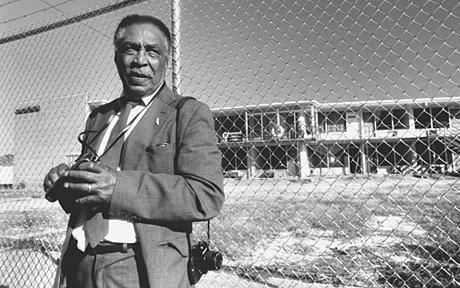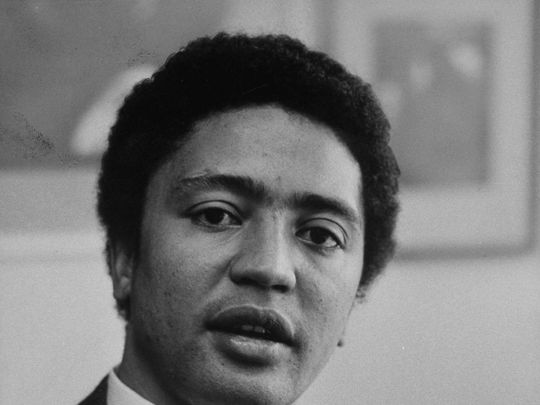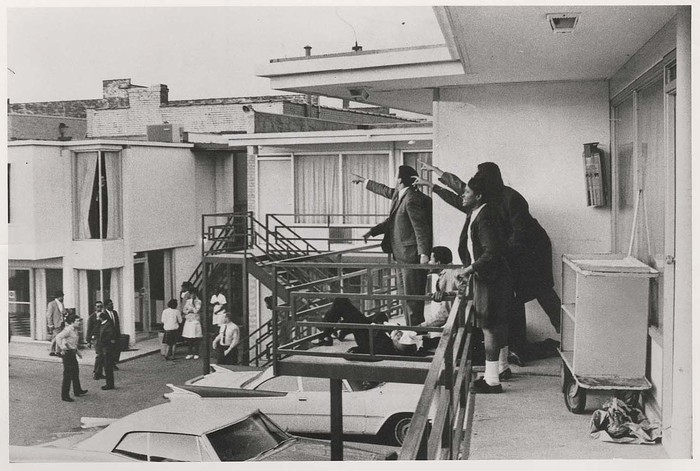Unknown to her, Clara was photographed standing next to James Orange by Joseph Louw, who was doing a documentary on MLK for the precursor of PBS. The iconic picture of witnesses pointing in the direction of the shooter is sometimes attributed to Ernest Withers, a prominent civil rights movement photographer.
Withers had been at his Beale Street studio when he heard King was shot. He ran to the Lorraine, where he met Louw and took him back to his darkroom to develop his film before returning to the Lorraine.
Over the next few days, rioting erupted in dozens of cities. Now, federal officials pressured the city of Memphis to settle the sanitation workers strike which had brought King to Memphis. On April 16, the strike ended with the recognition of the workers' union and wage increases.
FBI INFORMANT
"He informed on pastors and political candidates and alerted the FBI to planned demonstrations. Some of his information helped to disrupt a Memphis militant group called The Invaders in the late 1960s.

(WITHERS, LEFT)
The tip-offs were so detailed they included information on a teacher who had lent a car to a suspected militant, and how cigarettes were being brought to activists in jail. He even provided pictures of priests who were suspected of supporting striking black workers.
The day before Dr King's death Withers had been taking photographs of him, but he had also been telling the FBI about a meeting of suspected black militants.
The photographer was also at Dr King's funeral where he discovered information, passed on to the FBI, that two men blamed for a previous riot were planning a return to Memphis.
Withers' FBI role was revealed by a two-year investigation by Memphis newspaper The Commercial Appeal, who obtained some of his files under the Freedom of Information Act...
Historians of the civil rights movement described the unmasking of Withers as a shocking betrayal and an illustration of how far J Edgar Hoover's FBI was prepared to go to infiltrate it.
Withers, a former police officer, who also served in the Pacific in the Second World War, passed his tip-offs to two agents called Howell Lowe and William H Lawrence. He had eight children and there was speculation that his motives were financial.
Ethan Theoharis, a historian at Marquette University, Wisconsin, and author of a book on the FBI said: 'It is an amazing betrayal. It really speaks to the degree that the FBI was able to engage individuals within the civil rights movement. This man was so well trusted.'"
JOSEPH LOUW
"Joseph Louw had his iconic photo published in LIFE magazine. It was the seminal image of the tragedy, and his future seemed assured. But a year later, he moved back to Africa, where few people realized he'd shot the Lorraine photo. And he didn't tell them.

Louw (left) was travelling with King for a public television documentary. He had fled to the USA from his native South Africa in 1963. Under that nation's apartheid system, he was classified as ''coloured" -- mixed white and black -- and charged with having (consensual) sex with a white woman.
Those who knew him speculate about why he left America to practice journalism (first in Kenya, later in South Africa). John Ankele, an American friend, says Louw keenly felt the loss of hope that King's death symbolized, "so he went back to what he knew.''
Louw understood what he was leaving. Years later, his son Jacob found an invitation to the White House from 1968. "He laughed," Jacob recalls. "He said, 'Yeah, It was a big deal.' "
After the Lorraine, "he didn't ride the train" of celebrity journalism, Jacob says. "He felt there were other stories to tell ... African stories."
Louw's greatest satisfaction in Africa came from farming. He brought in three harvests before he died of cancer in 2003 at 64. U.S. newspapers and websites didn't carry his obituary.
--------------------------------------------------------------------------------------------------------------------------------------








JG said (January 21, 2019):
don't believe MLK was a "hater" and this is what distinguishes him from a lot of other black leaders in the past and present.
Unfortunately for Martin, he found out the hard way that you can't wear the hat of a communist activist and be a proclaimed Reverend at the same time. Communism and Christianity are opposed to each other in doctrine and belief. Communism advocates government and man to bring them their salvation. Christianity advocates salvation through Jesus Christ and his Word.
The civil rights movement didn't solve the ills of the black community. Equality rights and endless racial quotas didn't bring about equal abilities and behavoir. As a result a lot of things didn't change for many blacks and the black community as a whole.
The civil rights movement deceived many into believing that it was somehow a construct of God. Maybe this is why the MSM gave MLK the spotlight that they did.